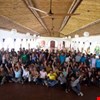


Following the SADC Water Week Conference held at Crossroads Hotel in Lilongwe, Malawi from the 13-15 May, 2015, the Malawi National Youth Water Network (MNYWN) was formed on the 14th of May, 2015. The setting up of the Network was in line with the SADC program for the African Minister’s Council on Water (AMCOW) Policy and Strategy on Mainstreaming Youth in the Water and Sanitation Sector through the Ministry of Agriculture, Irrigation and Water Development, Water Aid and Malawi Water Partnership.

The Global Water Partnership - Mediterranean (GWP-Med) coordinated the Drin Day 2016, joining forces with the Mediterranean Information Office for Environment Culture and Sustainable Development (MIO-ECSDE), in the framework of the Drin Project and the Act4Drin Project respectively.

A regional water youth network was created by participants to the recent Youth for Water Conference organised by GWP Central America, Movimiento de Jóvenes por el Agua (Youth Movement for Water, MOJA) and La Ruta del Clima (The Climate Route) and supported by GWP South America, UNICEF-Nicaragua, Reforestamos Mexico, and IUCN.

Upon finalization of the campaign ÔVI (eau=vie / water=life) that has been running throughout February and March in primary schools around Tunisia to raise awareness on water scarcity and the importance of water saving, the Global Water Partnership - Mediterranean (GWP-Med) celebrated the World Water Day by organizing a workshop on “Water, Youth and Employment” on Saturday, 19 March 2016, in Hammamet.

Last year a group of youth from more than 20 countries started a global initiative where they produced a white paper in the lead up to COP21, which allowed for a Youth Commitment under the Lima-Paris Action Agenda. GWP and partners are now taking the next step in launching a youth portal, where the voices of the young people will be gathered in one place. The portal is launched on World Water Day, 22 March.

The United Nations’ (UN) International Women’s Day is observed on March 8th each year. It’s a day to “celebrate the social, economic, cultural and political achievement of women.”

GWP-Med, along with Bewater Project partner, INRGREF, organised a national training in Zaghouan, Tunisia, for 30 Tunisian Youth NGO members active in water resources management issues, on November, 13th-14th, in order to raise their capacity to address the challenge of sustainable water resources management under climate change constraints.

From the 4th to the 8th of December 2015, GWP-CAf had offered a course on the module entitled “Water and Socio-Economic Development” (LPEE 233) to 2nd year students of the School of Wood, Water and Natural Resources of the Faculty of Agronomy and Agricultural Sciences at the University of Dschang , the Ebolowa Branch in South Region of Cameroon.
This activity is related to GWP-CAf strategic goal n°2: “Generate and communicate knowledge” developed in the implementation of the collaborative partnership established since 2007 between Global Water Partnership Central Africa with the University of Dschang, and thus oriented towards providing technical support in the delivery of Integrated Water Resource Management (IWRM) related courses.
Within 5 days, 65 out of 77 students attended the lectures which were organized and articulated on Definition of keys terms; introduction to IWRM, IWRM concept and principles, importance of monitoring water resources and river basins, Water and Environment, Economics and financing of water supply/virtual water concept as well as the Concept and implementation of participation.

En vue de la COP21, le Partenariat Mondial de l’Eau (Global Water Partnership, GWP) et l’Office Franco-Québecois de la Jeunesse unissent leurs forces pour mobiliser la Jeunesse Francophone sur les enjeux de l’Eau et du Changement Climatique.

En vue de la COP21, le Partenariat Mondial de l’Eau (Global Water Partnership, GWP) et l’Office Franco-Québecois de la Jeunesse unissent leurs forces pour mobiliser la Jeunesse Francophone sur les enjeux de l’Eau et du Changement Climatique.